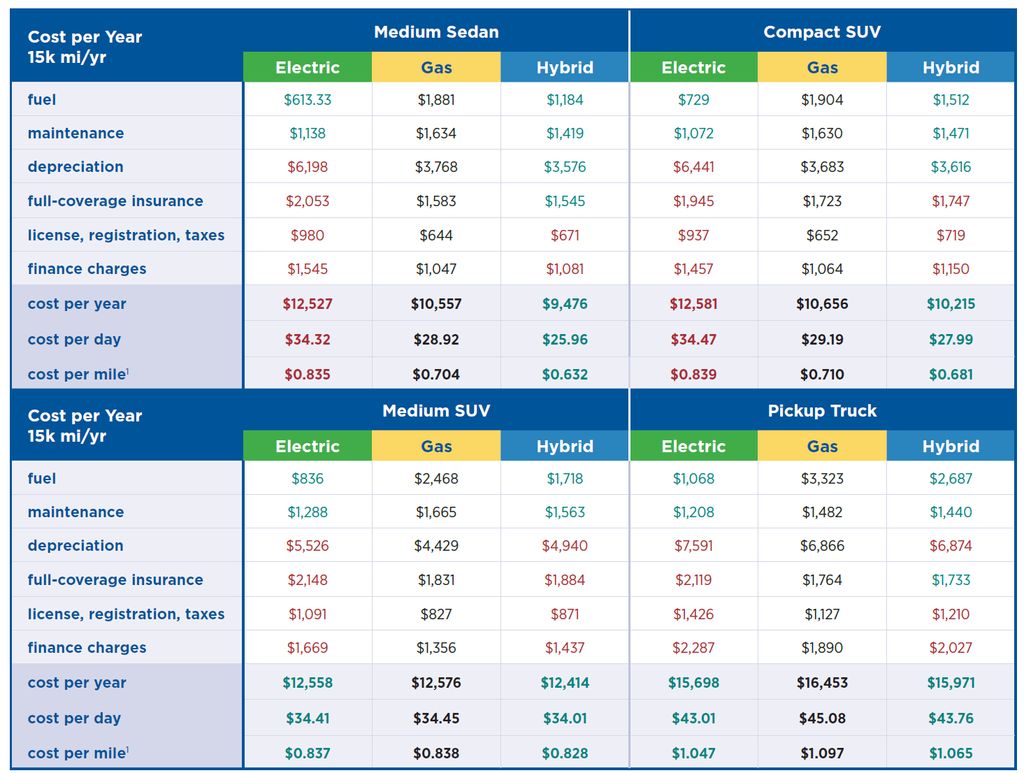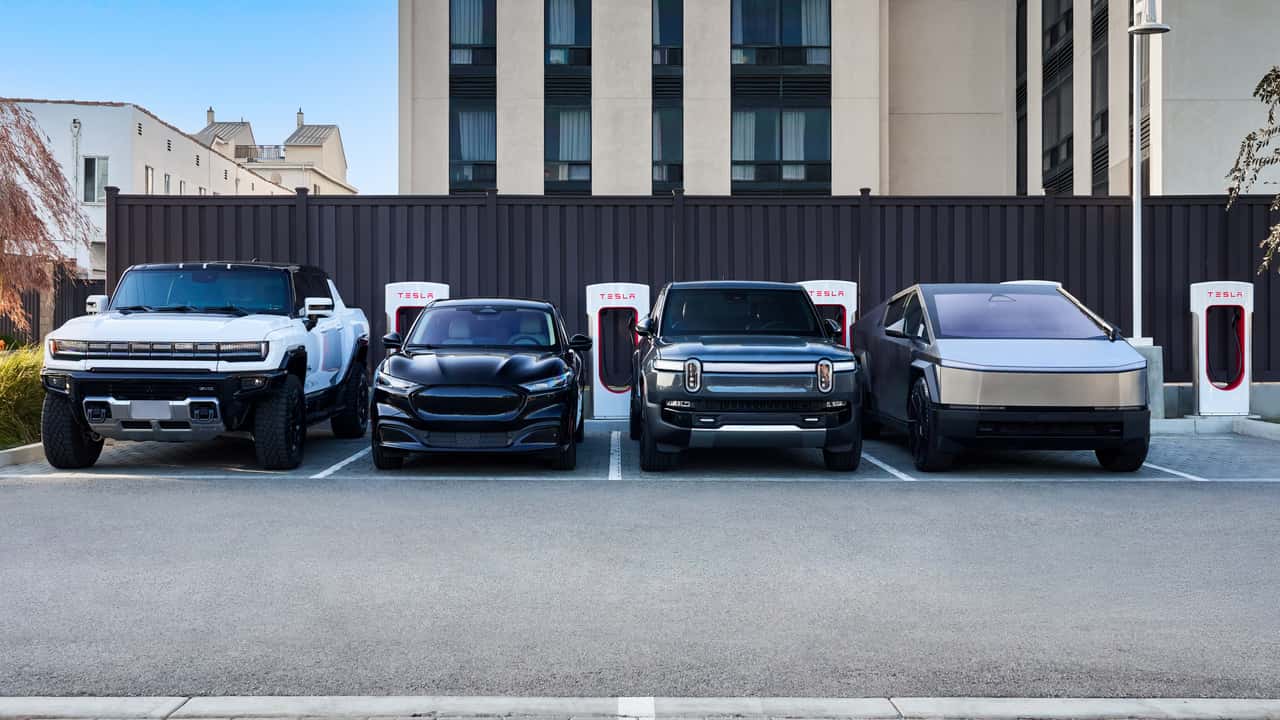- A new study from AAA reveals EVs have the lowest fuel and maintenance costs in the industry.
- At the same time, however, depreciation and insurance costs are among the highest.
Electric vehicles have the lowest fuel and maintenance costs in the United States compared to hybrid and gasoline vehicles, according to the AAA’s latest “Your Driving Costs” study. But while this is common knowledge among EV owners, especially those who have a few years of experience, AAA throws a curveball and says that all that advantage could be offset by the high depreciation experienced by EVs, as well as the higher full-coverage insurance.
That said, not all vehicle categories fall under this shadow, with bigger EVs keeping their position as the most affordable vehicles to own on a cost-per-year basis. Before I dive into the details, it’s worth noting that AAA’s study looked at the best-selling models in each category–11 in the case of EVs and hybrids–and noted the average costs for fuel, maintenance, depreciation, full-coverage insurance, license and registration fees and finance charges. Furthermore, the information below is relative to a yearly driving distance of 15,000 miles and a total ownership period of five years or 75,000 miles. For EVs, an average electricity price of 15.9 cents/kilowatt-hour was taken into account as the fuel price.
With all these variables in mind, the average operating cost for the whole industry, according to the AAA study, is $12,297 per year, $33.69 per day or $0.8198 per mile. In the case of EVs in general, the study revealed a yearly average operating cost of $12,704.
Hybrids came out at $9,910, mid-size gas pickups were at $12,366 and half-ton crew-cab gas pickups topped the chart with the highest yearly operating cost–$16,453 when driving 15,000 miles per year.
According to the AAA, the bigger the vehicle, the lower the average ownership costs for EVs. So, in the case of a medium sedan, the study revealed that going electric will actually be more expensive than a hybrid or even gas model, with a yearly cost of $12,527. The gasoline alternative is $2,000 cheaper per year, while the hybrid is about $3,000 less.

It’s the same story with compact SUVs, but when entering the medium SUV segment, things start to smooth out, with similar yearly operating costs across the board. In the case of pickups, EVs finally come up on top as the least expensive vehicles to own–$15,698 per year compared to $15,971 for hybrids and $16,453 for gas models.
That’s not a huge difference, but here’s the thing: these are average numbers. Depending on where you live, you might experience higher or lower costs with your EV because electricity and gasoline might cost more or less. In some places, energy prices might be much lower than gas at the pump, taking down the yearly cost with them. In other places where energy costs more, a hybrid or plug-in hybrid (as long as you plug it in) might make more sense.
Furthermore, some current or future EV owners might have photovoltaic panels installed at home, which brings down the fuel cost significantly–an advantage that can hardly be applied to gas or hybrid cars.
As always, though, it’s good to do your own research before signing a lease contract or emptying your savings account for a new car, irrespective of fuel type.
As the automotive industry continues to evolve, one of the most significant changes in recent years has been the rise of electric vehicles (EVs). These vehicles run on electricity, rather than gasoline or diesel, and offer a variety of benefits to consumers. According to a recent study by the American Automobile Association (AAA), EVs have the lowest fuel and maintenance costs compared to traditional gasoline-powered vehicles. However, the study also found that depreciation can be a significant drawback for EV owners.
One of the main advantages of owning an EV is the significantly lower fuel costs. While gasoline prices can fluctuate and increase over time, electricity prices tend to be more stable and generally lower on average. This means that EV owners can save a substantial amount of money on fuel costs over the lifetime of their vehicle. Additionally, EVs have fewer moving parts than traditional vehicles, which translates to lower maintenance costs. With fewer components requiring regular maintenance or replacement, EV owners can expect to spend less money on servicing their vehicles.
Despite these cost-saving benefits, the AAA study found that depreciation can be a major downside for EV owners. Depreciation refers to the decrease in value that a vehicle experiences over time. While all vehicles depreciate in value, EVs tend to lose their value at a faster rate than their gasoline-powered counterparts. This can be particularly problematic for EV owners looking to sell or trade in their vehicles in the future. The study found that EVs can lose up to 40% of their value within the first three years, compared to 26% for gasoline-powered vehicles.
It is important for consumers to consider all factors when deciding whether to purchase an EV. While the lower fuel and maintenance costs can result in significant savings over time, the potential for higher depreciation may offset some of these benefits. It is essential for consumers to conduct thorough research and consider their individual needs and preferences before making a decision. Additionally, as the market for EVs continues to grow and evolve, it is possible that depreciation rates may improve in the future.
In conclusion, EVs offer consumers the lowest fuel and maintenance costs compared to traditional gasoline-powered vehicles. However, the AAA study highlights that depreciation can be a significant drawback for EV owners. By weighing the pros and cons of EV ownership and conducting thorough research, consumers can make an informed decision that aligns with their financial goals and lifestyle.

